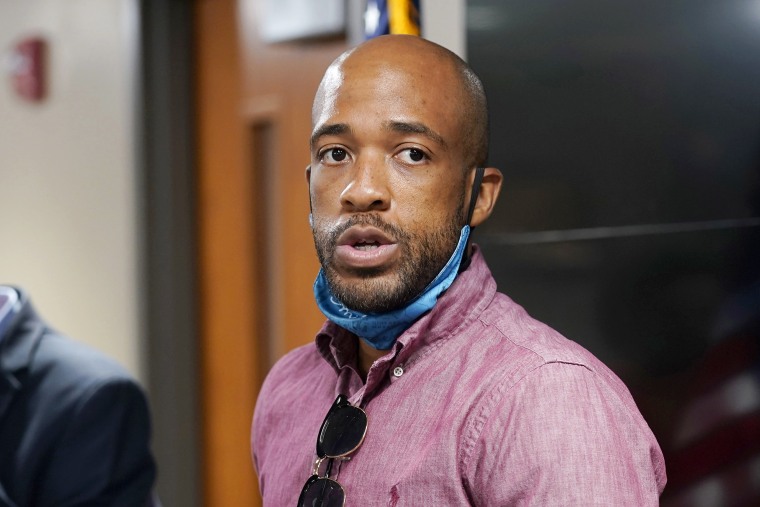WASHINGTON —Another Democrat is entering the race to challenge vulnerable incumbent Sen. Ron Johnson, R-Wis.
This morning, Wisconsin Lt. Gov. Mandela Barnes made it official, joining a field that already includes state Treasurer Sarah Godlewski, Milwaukee Bucks executive Alex Lasry, state Sen. Chris Larsen and Outagamie County Executive Tom Nelson.
And this competitive Democratic primary in Wisconsin — along with crowded fields also in North Carolina and Pennsylvania — will be an important 2022 story to watch over the next year.
Primary voters picking the right (or wrong) Democratic nominee in these uber-competitive states could likely determine the Senate majority in next year’s midterms.
In North Carolina, Democrats will be picking from a field that includes former state Supreme Court Chief Justice Cheri Beasley, state Sen. Jeff Jackson and former state Sen. Erica Smith.
And in Pennsylvania, the choices include Lt. Gov. John Fetterman, Montgomery County Commission Chair Val Arkoosh, state Rep. Malcolm Kenyatta — and possibly Congressman Conor Lamb.
These crowded and competitive primaries are definitely out of Senate Majority Leader Chuck Schumer’s comfort zone, where the Democratic establishment typically has zeroed in one candidate — whether it was, say, Mark Kelly in Arizona (who won last year), Raphael Warnock in Georgia (ditto) or Cal Cunningham in North Carolina (who lost).
Now the party has cleared primary fields in Florida (with Val Demings) and Ohio (with Tim Ryan), which are states the party has had a harder time winning in the last several election cycles.
But in the states that will likely decide the Senate majority — North Carolina, Pennsylvania and Wisconsin — Democrats will be holding free-for-all primaries.
At least for now.
The Democratic Senatorial Campaign Committee tells us that they will be assessing these campaigns and are keeping the option open of making an eventual endorsement.
McCarthy makes his move
House Minority Leader Kevin McCarthy on Monday announced his five picks for the House select committee to investigate the Jan. 6 attack on the Capitol.
“McCarthy tapped Reps. Jim Banks of Indiana, Jim Jordan of Ohio, Rodney Davis of Illinois, Kelly Armstrong of North Dakota and Troy Nehls of Texas to serve on the panel,” per NBC News.
As the Washington Post reminds us, all of these five Republicans voted against impeaching Donald Trump over his role in Jan. 6, and three of them (Banks, Jordan and Nehls) objected to certify the election results on that day.
Earlier this month, House Speaker Nancy Pelosi announced her eight picks, who included Rep. Liz Cheney, R-Wyo., who voted to impeach Trump.
The committee’s first hearing will take place on July 27.
Data Download: The numbers you need to know today
200 people: About how many Western officials tell NBC News have possible symptoms of “Havana Syndrome.”
12 hours: How long Rep. Marjorie Taylor Greene, R-Ga., will be suspended from Twitter for unsubstantiated Covid-19 claims.
14: The number of states that have seen an increase in Covid cases of at least 100 percent over the last two weeks, compared to the two prior weeks, per NBC News.
6: The number of Texas state House Democrats who have tested positive for Covid-19 since their travel to Washington D.C.
34,259,086: The number of confirmed cases of coronavirus in the United States, per the most recent data from NBC News and health officials. (That’s 74,792 more since yesterday.)
612,519: The number of deaths in the United States from the virus so far, per the most recent data from NBC News. (That’s 230 more since yesterday.)
338,247,434: The number of vaccine doses administered in the U.S., per the CDC.
48.6 percent: The share of all Americans who are fully vaccinated, per the CDC.
59.5 percent: The share of all American adults at least 18 years of age who are fully vaccinated, per CDC.
Tweet of the day
ICYMI: What else is happening in the world
Republicans are bearish on the chances of a bipartisan infrastructure deal.
The New York Times delves into the political and generational divides in the Ohio 11th district special election.
Pharmaceutical companies are expected to announce a $21 billion settlement this week as retribution for the opioid crisis, according to the Washington Post.
Forbes says former President Trump’s businesses made $2.4 billion in revenue during his presidency.
The Bootleg Fire is so intense it’s influencing the weather around it.



